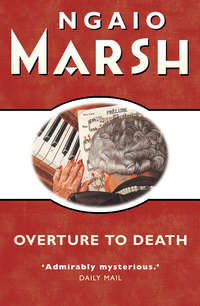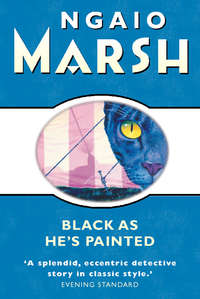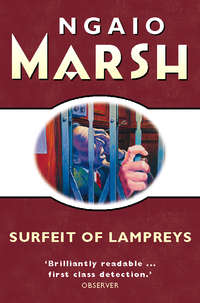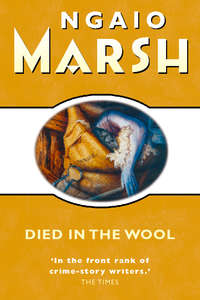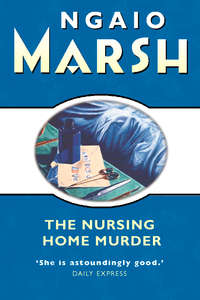
Полная версия
A Man Lay Dead

Ngaio Marsh
A Man Lay Dead

For My father and in memory of My Mother
Table of Contents
Cover Page
Title Page
Dedication
Chapter 1 ‘And There Were Present...’
Chapter 2 The Dagger
Chapter 3 ‘You Are the Corpse’
Chapter 4 Monday
Chapter 5 Mock Trial
Chapter 6 Alleyn Does His Stuff
Chapter 7 Rankin Leaves Frantock
Chapter 8 Following Information from a Baby
Chapter 9 Garden Piece
Chapter 10 Black Fur
Chapter 11 Confession?
Chapter 12 An Arrest and a Night Journey
Chapter 13 The Russian Element
Chapter 14 Meeting Adjourned
Chapter 15 Alleyn Comes Cleanish
Chapter 16 The Accused Was Charged
Epilogue
Copyright
About the Publisher
CHAPTER 1 ‘And There Were Present…’
Nigel Bathgate, in the language of his own gossip column, was ‘definitely intrigued’ about his weekend at Frantock. At twenty-five he had outgrown that horror of enthusiasm which is so characteristic of youth-grown-up. He was actually on his way to Frantock, and in ‘colossal form’ at the very thought of it. They were doing it in such grandeur, too! He leant back in his first-class corner seat and grinned at his cousin opposite. Odd sort of fellow, old Charles. One never knew much of what went on behind that long dark mask of his. Good-looking bloke, too; women adored him, reflected Nigel, mentally wagging his head—still flattered and made up to him although he was getting on in years…forty-six or -seven.
Charles Rankin returned his young cousin’s ruminative stare with one of those twisted smiles that always reminded Nigel of a faun.
‘Shan’t be long now,’ said Rankin. ‘The next station is ours. You can see the beginnings of Frantock over there to the left.’
Nigel stared across the patchwork landscape of little fields and hillocks to where a naked wood, fast, fast asleep in its wintry solitude, half hid the warmth of old brick.
‘That’s the house,’ said Rankin.
‘Who will be there?’ asked Nigel, not for the first time. He had heard much of Sir Hubert Handesley’s ‘unique and delightfully original house-parties’, from a brother journalist who had returned from one of them, if the truth be told, somewhat persistently enthusiastic. Charles Rankin, himself a connoisseur of house-parties, had refused many extremely enviable invitations in favour of these unpretentious weekends. And now, as the result of a dinner-party at old Charles’s flat, here was Nigel himself about to be initiated. So: ‘Who will be there?’ asked Nigel again.
‘The usual crowd, I suppose,’ answered Rankin patiently, ‘with the addition of one Doctor Foma Tokareff, who dates, I imagine, from Handesley’s Embassy days in Petrograd. There will be the Wildes, of course—they must be somewhere on the train. He’s Arthur Wilde, the archaeologist. Marjorie Wilde is…rather attractive, I think. And I suppose Angela North. You’ve met her?’
‘She’s Sir Hubert’s niece, isn’t she? Yes, she dined that night at your flat with him.’
‘So she did. If I remember, you seemed to get on rather pleasantly.’
‘Will Miss Grant be there?’ asked Nigel.
Charles Rankin stood up and struggled into his overcoat.
‘Rosamund?’ he said ‘Yes, she’ll be there.’
‘What an extraordinarily expressionless voice old Charles has got,’ reflected Nigel, as the train clanked into the little station and drew up with a long, steamy sigh.
The upland air struck chill after the stale stuffiness of the train. Rankin led the way out into a sunken country lane, where they found a group of three muffled passengers talking noisily while a chauffeur stowed luggage away into a six-seater Bentley.
‘Hullo, Rankin,’ said a thin, bespectacled man; ‘thought you must be on the train.’
‘I looked out for you at Paddington, Arthur,’ rejoined Rankin. ‘Have you met my cousin, all of you? Nigel Bathgate…Mrs Wilde…Mr Wilde. Rosamund, you have met, haven’t you?’
Nigel had made his bow to Rosamund Grant, a tall dark woman whose strange, uncompromising beauty it would be difficult to forget. Of the Hon. Mrs Wilde he could see nothing but a pair of very large blue eyes and the tip of an abbreviated nose. The eyes gave him a brief appraising glance, and a rather high-pitched ‘fashionable’ voice emerged from behind the enormous fur collar:
‘How do you do? Are you a relation of Charles? Too shattering for you. Charles, you will have to walk. I hate being steam-laundered even for five minutes.’
‘You can sit on my knee,’ said Rankin easily.
Nigel, glancing at him, noticed the peculiar bright boldness of his eyes. He was staring, not at Mrs Wilde, but at Rosamund Grant. It was as though he had said to her: ‘I’m enjoying myself: I dare you to disapprove.’
She spoke for the first time, her deep voice in marked contrast to Mrs Wilde’s italicized treble:
‘Here comes Angela in the fire-eater,’ she said, ‘so there will be tons of room for everybody.’
‘What a disappointment!’ said Rankin. ‘Marjorie, we are defeated.’
‘Nothing,’ said Arthur Wilde firmly, ‘will persuade me to drive back in that thing with Angela.’
‘Nor I neither,’ agreed Rankin. ‘Famous archaeologists and distinguished raconteurs should not flirt with death. Let us stay where we are.’
‘Shall I wait for Miss North?’ offered Nigel.
‘If you would, sir,’ said the chauffeur.
‘Do get in, Marjorie darling,’ murmured Arthur Wilde, who was sitting in the front seat. ‘I’m longing for my tea and bun.’
His wife and Rosamund Grant climbed into the back of the car, and Rankin sat between them. The two-seater sports car drew up alongside.
‘Sorry I’m late,’ shouted Miss Angela North. ‘Who’s for fresh air and the open road and the wind on the heath and what-not?’
‘They all sound loathsome to us,’ screamed Mrs Wilde from the Bentley. ‘We are leaving you Charles’s cousin.’ She opened her eyes very pointedly at Nigel. ‘He’s a fine, clean-limbed young Britisher. Just your style, Angela.’ The Bentley shot away down the lane.
Feeling incapable of the correct sort of facetiousness, Nigel turned to Angela North and uttered some inadequate commonplace about their having met before.
‘Of course we did,’ she said. ‘I thought you very nice. Get in rather quickly, and let’s catch them up.’
He climbed in beside her, and almost immediately had his breath snatched away by Miss North’s extremely progressive ideas on acceleration.
‘This is your first visit to Frantock,’ she observed, as they skidded dexterously round a muddy bend in the lane. ‘I hope you like it. We all think Uncle Hubert’s parties great fun…I don’t know why, quite. Nothing much happens at them. Everybody comes all over childish as a rule, and silly games are played amidst loud cheers and much laughter from those present. It’s going to be Murders this time. There they are!’
She caused the horn to give birth to a continuous belching roar, mended their speed by about fifteen or twenty miles an hour, and passed the Bentley as it were in a dream.
‘Have you ever played Murders?’ she asked.
‘No, nor yet suicides, but I’m learning,’ said Nigel politely.
Angela laughed uproariously. (‘She laughs like a small boy,’ thought Nigel.) ‘Feeling flustered?’ she shouted. ‘I’m a careful driver, really.’ She turned almost completely round in her seat to wave to the receding Bentley.
‘Soon be over now,’ she added.
‘I expect so,’ breathed Nigel.
The wrought-iron posterns of a gate flashed past them, and they dived into the rushing greyness of a wood.
‘This wood’s rather pleasant in the summer,’ remarked Miss North.
‘It looks lovely now,’ Nigel murmured, closing his eyes as they made for a narrow bridge.
A few moments later they swung into a wide curve of gravelled drive and stopped with dramatic brevity in front of a delightful old brick house.
Nigel extracted himself thankfully from the car and followed his hostess indoors.
He found himself in a really beautiful hall, dim with the smoky greyness of old oak and cheerful with the dancing comfort of a huge open fire. From the ceiling an enormous chandelier caught up the light of the flames and flickered and glowed with a strange intensity. Half drowned in the twilight that was already filling the old house, a broad staircase rose indefinitely at the far end of the hall. Nigel saw that the walls were hung conventionally with trophies and weapons…the insignia of the orthodox country house. He remembered Charles had told him that Sir Hubert possessed one of the finest collections of archaic weapons in England.
‘If you don’t mind giving yourself a drink and getting warm by the fire, I’ll rouse up Uncle Hubert,’ said Angela. ‘Your luggage is in the other car, of course. They’ll be here in a moment.’
She looked squarely at him and smiled.
‘I hope I haven’t completely unmanned you…by my driving, I mean.’
‘You have…but not by your driving,’ Nigel was astonished to hear himself reply.
‘Was that gallantry? It sounded like Charles.’
Somehow he gathered that to sound like Charles was a mistake.
‘I’ll be back in a jiffy,’ said Angela. ‘There are the drinks.’ She waved towards an array of glasses and disappeared into the shadows.
Nigel mixed a whisky-and-soda and wandered to the stairs. Here he saw hanging a long strip of leather, slotted to hold a venomous company of twisted blades and tortuously wrought hafts. Nigel had stretched out his hand towards a wriggling Malay kriss, when a sudden flood of light blazed across the steel and caused him to turn abruptly. A door on his right and opened. Silhouetted against the brilliance of the room beyond was a motionless figure.
‘Excuse me,’ said an extremely deep voice, ‘we have not met, I believe. Allow me to make an introduction of myself. Doctor Foma Tokareff. You are interested in Oriental weapons?’
Nigel had given a very noticeable start at this unexpected interruption. He recovered himself and stepped forward to meet the smiling Russian, who advanced with his hand outstretched. The young journalist closed his fist on a bunch of thin fingers that lay inert for a second and then suddenly tightened in a wiry grip. Inexplicably he felt gauche and out of place.
‘I beg your pardon…how do you do? No…well, yes, interested, but I’m afraid very ill-informed,’ stammered Nigel.
‘Ah!’ ejaculated Doctor Tokareff deeply. ‘You will by compulsion learn somesing of the weapons (he pronounced it ‘ooe-ponz’) of the ancients if you stay here. Sir Hubert is a great authority and an enthusiastic collector.’
He spoke with extreme formality, and his phrases with their curiously stressed inflexions sounded pedantic and unreal. Nigel murmured something about being very ignorant, he was afraid, and was relieved to hear the hoot of the Bentley.
Angela came running back out of the shadows; simultaneously a butler appeared, and in a moment the hall was clamorous with the arrival of the rest of the party. A cheerful voice sounded from the head of the stairs, and Sir Hubert Handesley came down to welcome his guests.
Perhaps the secret of the success of the Frantock parties lay entirely in the charm of the host. Handesley was a singularly attractive man. Rosamund Grant once said that it wasn’t fair for one individual to have so many good things. He was tall, and although over fifty years of age had retained an athlete’s figure. His hair, dead white, had not suffered the indignity of middle age, but lay, thick and sleek, on his finely shaped head. His eyes were a peculiarly vivid blue, and deep-set under heavily marked brows, his lips firm and strongly compressed at the corners: altogether an almost too handsome man. His brain was of the same stereotyped quality as his looks. An able diplomat before the war, and after it a Cabinet Minister of rather orthodox brilliance, he still found time to write valuable monographs on the subject of his ruling passion—the fighting tools of the older civilizations—and to indulge his favourite hobby—he had almost made it a science—of organizing amusing house-parties.
It was characteristic of him that after a general greeting he should concentrate on Nigel, the least of his guests.
‘I’m so glad you’ve been able to come, Bathgate,’ he said. ‘Angela tells me she fetched you from the station. Ghastly experience, isn’t it? Charles should have warned you.’
‘My dear, he was too intrepid,’ shouted Mrs Wilde. ‘Angela took and threw him into her squalid little tumbril, and he flashed past us with set green lips and eyes that had gazed upon stark death. Charles is so proud of his relative…aren’t you, Charles?’
‘He’s a pukka sahib,’ agreed Rankin solemnly.
‘Are we really going to play the Murder Game?’ asked Rosamund Grant. ‘Angela ought to win it.’
‘We are going to play A Murder Game…a special brand of your own, isn’t it, Uncle Hubert?’
‘I’ll explain my plans,’ said Handesley, ‘when everyone has got a cocktail. People always imagine one is so much more amusing after one has given them something to drink. Will you ring for Vassily, Angela?’
‘A gam’ of murderings?’ said Doctor Tokareff, who had been examining one of the knives. The firelight gleamed on his large spectacles, and he looked, as Mrs Wilde murmured to Rankin, ‘too grimly sinister.’…‘A gam’ of murderings? That should be sush a good fun. I am ignorant of this gam’.’
‘In its cruder form it is very popular at the moment,’ said Wilde, ‘but I feel sure Handesley has invented subtleties that will completely transform it.’
A door on the left of the stairs opened, and through it came an elderly Slav carrying a cocktail shaker. He was greeted enthusiastically.
‘Vassily Vassilyevitch,’ began Mrs Wilde in Anglo-Russian of comic-opera vintage. ‘Little father! Be good enough to bestow upon this unworthy hand a mouthful of your talented concoction.’
Vassily nodded his head and smiled genially. He opened the cocktail shaker, and with an air of superb and exaggerated concentration poured out a clear yellowish mixture.
‘What do you think of it, Nigel?’ asked Rankin. ‘It’s Vassily’s own recipe. Marjorie calls it the Soviet Repression.’
‘Not much repression about it,’ murmured Arthur Wilde.
Nigel, sipping gingerly at his portion, was inclined to agree.
He watched the old Russian fussing delightedly among the guests. Angela told him that Vassily had been in her uncle’s service ever since he was a young attaché at Petersburg, Nigel’s eyes followed him as he moved amongst that little group of human molecules with whom, had he but known it, he himself was to become so closely and so horribly associated.
He saw his cousin, Charles Rankin, of whom, he reflected, he knew actually so little. He sensed some sort of emotional link between Charles and Rosamund Grant. She was watching Rankin now as he leant, with something of the conventional philanderer in his pose, towards Marjorie Wilde. ‘Mrs Wilde is more his affair, really, than Rosamund,’ thought Nigel. ‘Rosamund is too intense. Charles likes to be comfortable.’ He looked at Arthur Wilde, who was talking earnestly with their host. Wilde had none of Handesley’s spectacular looks, but his thin face was interesting and, to Nigel, attractive. There was quality in the form of the skull and jaw, and a sensitive elusiveness about the set of the lips.
He wondered how two such widely diverging types as this middle-aged student and his fashionable wife could ever have attracted each other. Beyond them, half in the shadow, stood the Russian doctor, his head inclined forward, his body erect and immobile.
‘What does he make of us?’ wondered Nigel.
‘You look very grim,’ said Angela at his elbow. ‘Are you concocting a snappy bit for your gossip page, or thinking out a system for the Murder Game?’
Before he could answer her, Sir Hubert broke in on the general conversations: ‘The dressing-bell goes in five minutes,’ he said, ‘so if you are all feeling strong enough, I’ll explain the principles of my edition of the Murder Game.’
‘Company…‘shun!’ shouted Rankin.
CHAPTER 2 The Dagger
‘The idea is this,’ began Sir Hubert, as Vassily delicately circulated his mixture: ‘you all know the usual version of the Murder Game. One person is chosen as the murderer, his identity being concealed from all the players. They scatter, and he seizes his moment to ring a bell or bang a gong. This symbolizes the “murder”. They collect and hold a trial, one person being appointed as prosecuting attorney. By intensive examination he tries to discover the “murderer”.’
‘Excuse me, please,’ said Doctor Tokareff. ‘I am still, how you say, unintelligible. I have not been so happy to gambol in susha funny sport heretobefore, so please make him for me more clearer.’
‘Isn’t he sweet?’ asked Mrs Wilde, a good deal too loudly.
‘I will explain my version,’ said Sir Hubert, ‘and I think it will then be quite clear. Tonight at dinner one of us will be handed a little scarlet plaque by Vassily. I myself do not know upon which of the party his choice will fall, but let us pretend, for the sake of argument, that Mr Bathgate is cast by Vassily for the part of the murderer. He will take his scarlet plaque and say nothing to anybody. He has between five-thirty tomorrow afternoon and eleven tomorrow night as the time allotted for the performance of his “murder”. He must try to get one of us alone, unknown to the others, and at the crucial moment tap him on the shoulder and say, “You are the corpse”. He will then switch off the lights at the main behind the stair wall. The victim must instantly fall down as though dead, and Mr Bathgate must give one good smack at that Assyrian gong there behind the cocktail tray and make off to whatever spot he considers least incriminating. As soon as the lights go off and we hear the gong, we must all remain where we are for two minutes…you can count your pulse-beats for a guide. At the end of two minutes we may turn up the lights. Having found the “corpse”, we shall hold the trial, with the right, each of us, to cross-examine every witness. If Mr Bathgate has been clever enough, he will escape detection. I hope I have made everything reasonably understandable.’
‘Pellucidly explicit,’ said Doctor Tokareff. ‘I shall enjoy immensely to take place in such intellectual diversion.’
‘He isn’t a bit pompous really,’ whispered Angela in Nigel’s ear, ‘but he memorizes four pages of Webster’s Dictionary every morning after a light breakfast. Do you hope Vassily chooses you for “murderer”?’ she added aloud.
‘Lord, no!’ laughed Nigel. ‘For one thing, I don’t know the lie of the land. Couldn’t you show me round the house in case I have to?’
‘I will…tomorrow.’
‘Promise?’
‘Cross my heart.’
Rosamund Grant had wandered across to the foot of the stairs. She drew a long, subtly-curving dagger from the strip of leather and laid it flat upon her palm.
‘The murderer has plenty of weapons to hand,’ she said lightly.
‘Put that beastly thing away, Rosamund,’ said Marjorie Wilde, with a note of very real terror in her voice; ‘they give me the horrors…all knives do. I can’t even endure watching people carve…ugh!’
Rankin laughed possessively.
‘I’m going to terrify you, Marjorie,’ he said. ‘I’m actually carrying a dagger in my overcoat pocket at this very moment.’
‘Are you, Charles? But why?’
It was the first time Nigel had heard Rosamund Grant speak to his cousin that evening. She stood there on the bottom step of the stairs looking like some modern priestess of an ancient cult.
‘It was sent me yesterday,’ said Rankin, ‘by a countryman of yours, Doctor Tokareff, whom I met in Switzerland last year. I did him rather a service—lugged him out of a crevasse where he had lingered long enough to sacrifice two of his fingers to frostbite—and he sent me this, as a thank-offering, I suppose. I brought it down to show you, Hubert…I thought Arthur might like to have a look at it, too. Our famous archaeologist, you know. Let me get it. I left my overcoat in the porch out there.’
‘Vassily, get Mr Rankin’s coat,’ said Sir Hubert.
‘I hope you don’t expect me to look at it,’ said Mrs Wilde. ‘I’m going to dress.’
She did not move, however, but only put her hand through her husband’s arm. He regarded her with a kind of gentle whimsicality which Nigel thought very charming.
‘It’s true, isn’t it, Arthur?’ she said. ‘I haven’t read one of your books because you will butter your pages with native horrors.’
‘Marjorie’s reaction to knives or pointed tools of any sort is not an uncommon one,’ said Wilde. ‘It probably conceals a rather interesting repression.’
‘Do you mean that privately she’s a blood-thirster?’ asked Angela, and everyone laughed.
‘Well, we shall see,’ said Rankin, taking his coat from Vassily and producing a long, carved silver case from one of the pockets.
Nigel, who was standing beside his cousin, heard a curiously thin, sibilant noise close behind him. He turned his head involuntarily. At his elbow stood the old servant transfixed, his eyes riveted on the sheath in Rankin’s hands. Instinctively Nigel glanced at Doctor Tokareff. He too, from the farther side of the cocktail tray, was looking, quite impassively, at the new dagger.
‘By Jove!’ murmured Sir Hubert quietly.
Rankin, gripping the silver sheath, slowly drew out an excessively thin, tapering blade. He held the dagger aloft. The blade, like a stalactite, gleamed blue in the firelight.
‘It is extremely sharp,’ said Rankin.
‘Arthur…don’t touch it!’ cried Marjorie Wilde.
But Arthur Wilde had already taken the dagger, and was examining it under a wall-bracket lamp.
‘This is quite interesting,’ he murmured. ‘Handesley, come and look.’
Sir Hubert joined him, and together they bent their heads over Rankin’s treasure.
‘Well?’ asked Rankin carelessly.
‘Well,’ returned Wilde, ‘your service to your friend, whoever he may have been, should have been of considerable value to have merited such a reward, my dear Charles. The dagger is a collector’s piece. It is of extreme antiquity. Handesley and Doctor Tokareff will correct me if I am mistaken.’
Sir Hubert was staring as if, by the very intensity of his gaze, he could see back through the long perspective of its history into the mind of the craftsman who had fashioned it.
‘You are right, Wilde. Of the very greatest antiquity. Obviously Mongolian. Ah, you beauty!’ he whispered.
He straightened his back, and Nigel thought that he made a supreme effort to wipe away from his face and his voice all the covetousness of the ardent collector.
‘Charles,’ he said lightly, ‘you have aroused my worst passion. How dare you!’
‘What does Doctor Tokareff say?’ asked Rosamund suddenly.
‘I should deferentiate,’ said the Russian, ‘to zis august learning of Sir H. Handesley…and additionally to Mr Ooilde. Nevertheless, I make a suggestion that to possess zis knife is not altogezzer enviable.’
Vassily stood motionless behind Nigel. Somehow the latter was aware of his vehement concentration. Could he understand the pedantic English of his countryman?


